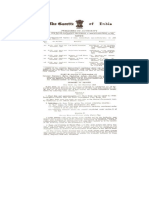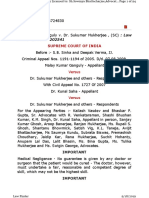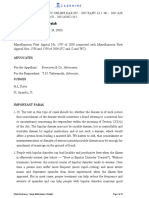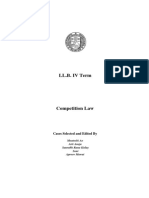0 ratings0% found this document useful (0 votes)
29 viewsProcedure For Sessions Trial
Procedure For Sessions Trial
Uploaded by
Arihant RoyUnder the Code of Criminal Procedure
Copyright:
© All Rights Reserved
Available Formats
Download as PDF or read online from Scribd
Procedure For Sessions Trial
Procedure For Sessions Trial
Uploaded by
Arihant Roy0 ratings0% found this document useful (0 votes)
29 views3 pagesUnder the Code of Criminal Procedure
Original Title
Procedure for Sessions Trial
Copyright
© © All Rights Reserved
Available Formats
PDF or read online from Scribd
Share this document
Did you find this document useful?
Is this content inappropriate?
Under the Code of Criminal Procedure
Copyright:
© All Rights Reserved
Available Formats
Download as PDF or read online from Scribd
Download as pdf
0 ratings0% found this document useful (0 votes)
29 views3 pagesProcedure For Sessions Trial
Procedure For Sessions Trial
Uploaded by
Arihant RoyUnder the Code of Criminal Procedure
Copyright:
© All Rights Reserved
Available Formats
Download as PDF or read online from Scribd
Download as pdf
You are on page 1of 3
| Daily Doc +
AKcLe J PYaP | Sem4 { crPc / Unit4
Discuss in detail the procedure of
sessions trial.
@ Add Source @ Show Tags
1, Introduction to Fair Trial
1. Due process of law requires that every proceeding shall be fair,
thereby ensuring that presumption of innocence is rebutted only on
meeting the highest safeguards of fair procedures of trial.
2. The right to fair trial is a fundamental and constitutional right.
3. It is also well acknowledged in International Law (Article 10 of the
UDHR and Article 6 of the ECHR)
4,"Due process of law requires that the proceedings shall be fair, but
fairness is a relative and not absolute concept, what is fair in one set
of circumstances may be an act of tyranny in others" <> this
statement by SCOTUS summarizes the problem with defining ‘due
process’ <> though there has to be a fixed standard for everyone to
follow, and for which no exceptions can be made.
2. Introduction to Sessions Trial J
1. After a Police Report is filed, the competent magistrate takes
cognizance of the case and if the case is triable by "Court of Session"
then under s. 209, transfers the case up to it.
2. From the moment of transfer, the "Court of Session" must adhere to
Chapter 18 of the Code.
3. Procedure for Sessions Trial J
1, Prosecution's Opening < After the accused is brought before the
court the PP describes the accusations against the accused and
state the evidence by which he proposes to prove the accused
guilty <> s. 225 and 226
2. Framing of Charge/ Discharge J
1. Itis the court's duty to consider the record of the case and the
documents submitted to it <> and to hear the submissions of the
accused and the prosecution as to whether the accused should
be discharged or charges framed
2.If the judge considers that < there is no sufficient reasons for
proceeding further against the accused <> he shall discharge
him (s. 227).
3.If the judge considers that © there is sufficient reasons for
proceeding further against the accused <> he shall frame charge
against the accused.
3. Reading of Charge and Plea J
1. The judge shall read out and explain the charge to the
accused <> and the accused shall be asked whether he pleads
guilty to the charge or claims to be tried <> s228(2)
2.If the accused pleads guilty <> the judge may convict him at once
after recording the plea © s. 229
3.If the accused refuses to plead guilty or claims to be tried < the
judge shall fix a date for taking evidence for the prosecution
© and issue process for the attendance of such witnesses as
applied for by the prosecution <> s. 230-231
4. Order of Acquittal J
1. After the evidence for the prosecution is taken, <> the judge shall
examine the accused and hear both the prosecution and the
defence <> on the question of whether the accused is entitled to
be acquitted at that stage.
2.If the judge after considering the above < comes to hold that
“there is no evidence (as adduced by the prosecution) that the
accused committed the offence" <> the judge shall record an
order of acquittal of the accused without proceeding further
© 8.232
5. Defence's Entry 4
1. If the accused is not acquitted u/s 232 <> he shall be called on to
enter his defence.
2. The accused may, thereupon put in a written statement <> and
apply for process of compelling the production of any witness or
of any document or thing <> s 233
6. Closing of Defence Evidence V
1. The closing of the defence evidence <> will be followed by the
arguments of both the parties and the judgment <> s 234 and
235.
4. Additional Notes J
1. Trial to be conducted by PP
You might also like
- The Subtle Art of Not Giving a F*ck: A Counterintuitive Approach to Living a Good LifeFrom EverandThe Subtle Art of Not Giving a F*ck: A Counterintuitive Approach to Living a Good LifeRating: 4 out of 5 stars4/5 (5978)
- The Gifts of Imperfection: Let Go of Who You Think You're Supposed to Be and Embrace Who You AreFrom EverandThe Gifts of Imperfection: Let Go of Who You Think You're Supposed to Be and Embrace Who You AreRating: 4 out of 5 stars4/5 (1110)
- Never Split the Difference: Negotiating As If Your Life Depended On ItFrom EverandNever Split the Difference: Negotiating As If Your Life Depended On ItRating: 4.5 out of 5 stars4.5/5 (893)
- Hidden Figures: The American Dream and the Untold Story of the Black Women Mathematicians Who Helped Win the Space RaceFrom EverandHidden Figures: The American Dream and the Untold Story of the Black Women Mathematicians Who Helped Win the Space RaceRating: 4 out of 5 stars4/5 (932)
- Grit: The Power of Passion and PerseveranceFrom EverandGrit: The Power of Passion and PerseveranceRating: 4 out of 5 stars4/5 (619)
- Shoe Dog: A Memoir by the Creator of NikeFrom EverandShoe Dog: A Memoir by the Creator of NikeRating: 4.5 out of 5 stars4.5/5 (545)
- The Hard Thing About Hard Things: Building a Business When There Are No Easy AnswersFrom EverandThe Hard Thing About Hard Things: Building a Business When There Are No Easy AnswersRating: 4.5 out of 5 stars4.5/5 (356)
- Her Body and Other Parties: StoriesFrom EverandHer Body and Other Parties: StoriesRating: 4 out of 5 stars4/5 (831)
- Elon Musk: Tesla, SpaceX, and the Quest for a Fantastic FutureFrom EverandElon Musk: Tesla, SpaceX, and the Quest for a Fantastic FutureRating: 4.5 out of 5 stars4.5/5 (476)
- The Emperor of All Maladies: A Biography of CancerFrom EverandThe Emperor of All Maladies: A Biography of CancerRating: 4.5 out of 5 stars4.5/5 (275)
- The Little Book of Hygge: Danish Secrets to Happy LivingFrom EverandThe Little Book of Hygge: Danish Secrets to Happy LivingRating: 3.5 out of 5 stars3.5/5 (424)
- The World Is Flat 3.0: A Brief History of the Twenty-first CenturyFrom EverandThe World Is Flat 3.0: A Brief History of the Twenty-first CenturyRating: 3.5 out of 5 stars3.5/5 (2272)
- The Yellow House: A Memoir (2019 National Book Award Winner)From EverandThe Yellow House: A Memoir (2019 National Book Award Winner)Rating: 4 out of 5 stars4/5 (99)
- Devil in the Grove: Thurgood Marshall, the Groveland Boys, and the Dawn of a New AmericaFrom EverandDevil in the Grove: Thurgood Marshall, the Groveland Boys, and the Dawn of a New AmericaRating: 4.5 out of 5 stars4.5/5 (270)
- The Sympathizer: A Novel (Pulitzer Prize for Fiction)From EverandThe Sympathizer: A Novel (Pulitzer Prize for Fiction)Rating: 4.5 out of 5 stars4.5/5 (125)
- Team of Rivals: The Political Genius of Abraham LincolnFrom EverandTeam of Rivals: The Political Genius of Abraham LincolnRating: 4.5 out of 5 stars4.5/5 (235)
- A Heartbreaking Work Of Staggering Genius: A Memoir Based on a True StoryFrom EverandA Heartbreaking Work Of Staggering Genius: A Memoir Based on a True StoryRating: 3.5 out of 5 stars3.5/5 (232)
- On Fire: The (Burning) Case for a Green New DealFrom EverandOn Fire: The (Burning) Case for a Green New DealRating: 4 out of 5 stars4/5 (75)
- The Unwinding: An Inner History of the New AmericaFrom EverandThe Unwinding: An Inner History of the New AmericaRating: 4 out of 5 stars4/5 (45)
- Ebix Singapore Private Limited vs. Committee of Creditors of Educomp Solutions Limited & Anr. (Civil Appeal No. 3224 of 2020 and Other Appeals)Document11 pagesEbix Singapore Private Limited vs. Committee of Creditors of Educomp Solutions Limited & Anr. (Civil Appeal No. 3224 of 2020 and Other Appeals)Arihant RoyNo ratings yet
- Delhi Development (Master Plan and Zonal Development Plan) Rules, 1959Document4 pagesDelhi Development (Master Plan and Zonal Development Plan) Rules, 1959Arihant RoyNo ratings yet
- Ghanashyam Mishra & Sons vs. Edelweiss ARC & Ors. (Civil Appeal No. 8129 of 2019 With WP (Civil) No. 1177 of 2020 and Civil Appeals No. 1550-1554Document4 pagesGhanashyam Mishra & Sons vs. Edelweiss ARC & Ors. (Civil Appeal No. 8129 of 2019 With WP (Civil) No. 1177 of 2020 and Civil Appeals No. 1550-1554Arihant RoyNo ratings yet
- Dharani Sugars and Chemicals Ltd. vs. Union of India & Ors.Document4 pagesDharani Sugars and Chemicals Ltd. vs. Union of India & Ors.Arihant RoyNo ratings yet
- Arun Kumar Jagatramka. vs. Jindal Steel and Power Ltd. & Anr. (Civil Appeal No. 9664 of 2019 and Other Appeals)Document5 pagesArun Kumar Jagatramka. vs. Jindal Steel and Power Ltd. & Anr. (Civil Appeal No. 9664 of 2019 and Other Appeals)Arihant RoyNo ratings yet
- Shrikant Anandrao Bhosale vs. State of Maharashtra (2002) 7 SCC 748Document11 pagesShrikant Anandrao Bhosale vs. State of Maharashtra (2002) 7 SCC 748Arihant RoyNo ratings yet
- VIMP Goyal Hospital and Research Centre v. K.gopal Shukla (N.C.D.R.C) (New Delhi) Law Finder Doc Id # 536849Document14 pagesVIMP Goyal Hospital and Research Centre v. K.gopal Shukla (N.C.D.R.C) (New Delhi) Law Finder Doc Id # 536849Arihant RoyNo ratings yet
- Gowri Gopal Hospital v. P. Sudhakar (N.C.D.R.C.) (New Delhi) Law Finder Doc Id # 586013Document3 pagesGowri Gopal Hospital v. P. Sudhakar (N.C.D.R.C.) (New Delhi) Law Finder Doc Id # 586013Arihant RoyNo ratings yet
- CASEMINE - Sheralli Wali Mohammed v. State of MaharashtraDocument4 pagesCASEMINE - Sheralli Wali Mohammed v. State of MaharashtraArihant RoyNo ratings yet
- CASEMINE - Deepak Bapurao Yedage v. State of MaharashtraDocument8 pagesCASEMINE - Deepak Bapurao Yedage v. State of MaharashtraArihant RoyNo ratings yet
- IMP Malay Kumar Ganguly v. Dr. Sukumar Mukherjee, (SC) Law Finder Doc Id # 202541Document94 pagesIMP Malay Kumar Ganguly v. Dr. Sukumar Mukherjee, (SC) Law Finder Doc Id # 202541Arihant RoyNo ratings yet
- Nalini Kumari v. K.S Bopaiah 2006 SCC ONLINE KAR 697Document19 pagesNalini Kumari v. K.S Bopaiah 2006 SCC ONLINE KAR 697Arihant RoyNo ratings yet
- The Creatine Report in Association With: &Document43 pagesThe Creatine Report in Association With: &Arihant Roy100% (1)
- PAPER-LB - 4033 COMPETITION LAW (New Syllabus)Document431 pagesPAPER-LB - 4033 COMPETITION LAW (New Syllabus)Arihant RoyNo ratings yet
- Thermogenic: Hormone RegulatorsDocument3 pagesThermogenic: Hormone RegulatorsArihant RoyNo ratings yet
- LB-603 Environmental Law Full Material January 2018Document698 pagesLB-603 Environmental Law Full Material January 2018Arihant RoyNo ratings yet
- LB-6031 Interpretation of Stautes and Principle of Legislation Full Material January 2018Document446 pagesLB-6031 Interpretation of Stautes and Principle of Legislation Full Material January 2018Arihant RoyNo ratings yet
- LB-604 Taxation Laws Full Case Material January 2018 (Amended)Document418 pagesLB-604 Taxation Laws Full Case Material January 2018 (Amended)Arihant RoyNo ratings yet
- Brand Product Form RTDDocument4 pagesBrand Product Form RTDArihant RoyNo ratings yet
- IV Term LL.B-4033-Competition Law-2018Document207 pagesIV Term LL.B-4033-Competition Law-2018Arihant RoyNo ratings yet
- LB-203 - Law of Crimes - II Full Material Jan 2018Document261 pagesLB-203 - Law of Crimes - II Full Material Jan 2018Arihant RoyNo ratings yet





























































